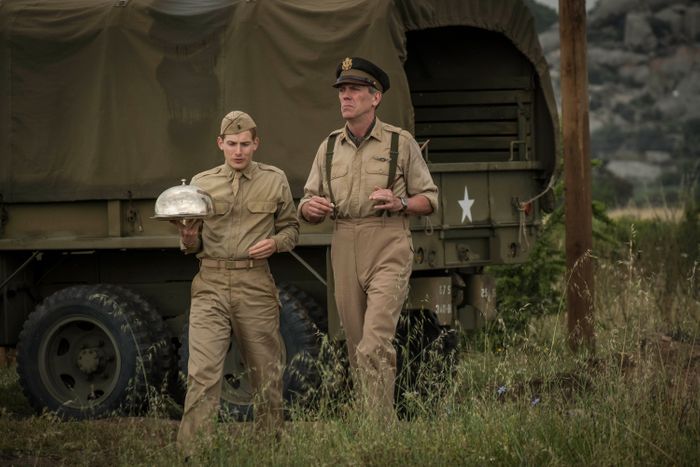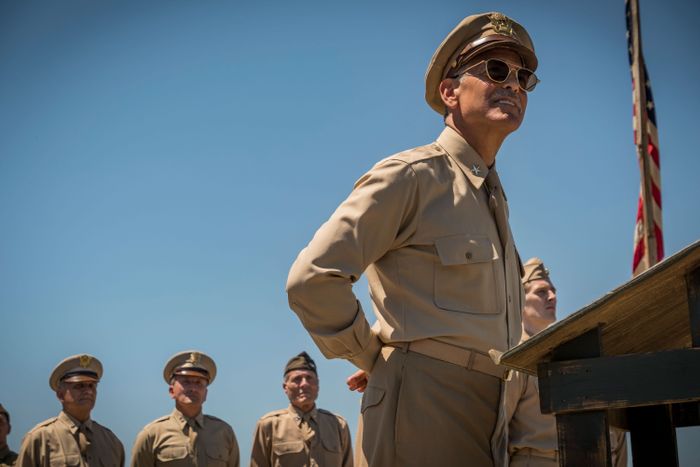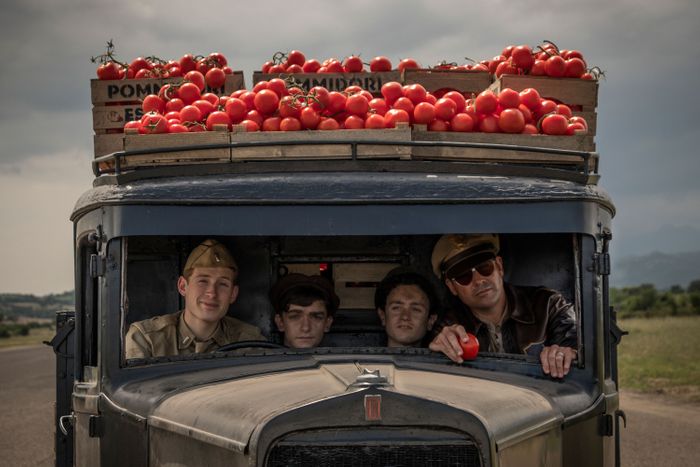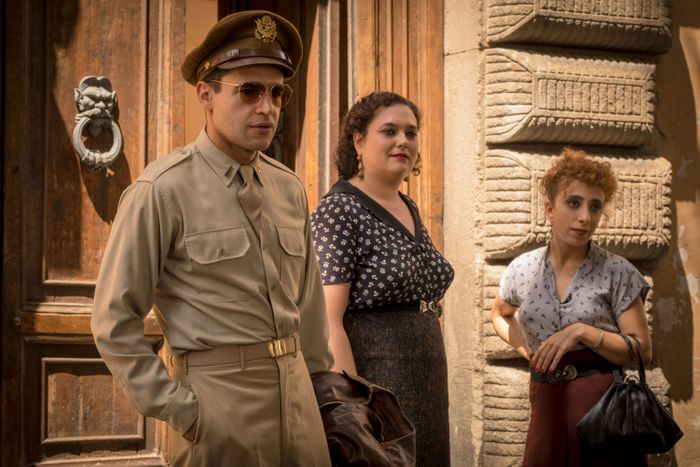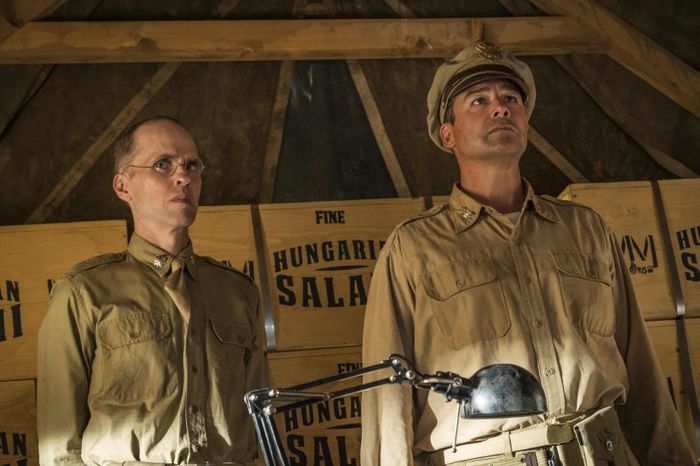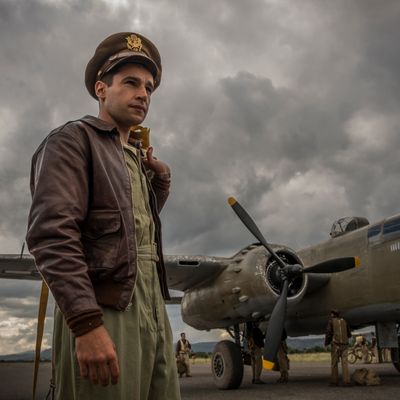
In the new Catch-22, Joseph Heller’s World War II masterpiece of epic absurdities is given the Hulu miniseries treatment by writers Luke Davies and David Michod and directors Grant Heslov, George Clooney, and Ellen Kuras. Collectively, these filmmakers make some bold choices in condensing the 450-page 1961 satirical novel, retaining familiar characters and classic moments while leaving a wealth of character arcs and contradictory shenanigans behind in Heller’s prose.
To help sort out which narrative avenues the miniseries’ creators were most interested in exploring — and how they led to a much different ending from the book — we’ve outlined the changes, both major and minor, that the miniseries makes to Heller’s novel. Naturally, spoilers for the book and the series alike lie ahead.
The Order of Events
The book: Heller’s arrangement of the events that befall central soldier Yossarian does not lend itself to a tidy sequential narrative; rather, it comprises certain episodes, like Snowden’s death, that are referred back to and later elaborated on. The turmoil of memory often dictates when sequences are referenced, with one incident suddenly leading to the telling of another in the past. This non-chronological storytelling puts the focus on the emotional arc that takes Yossarian from the first time we see him in a hospital through his final flight to Sweden.
The miniseries: The series is told mostly chronologically, though it does start with a traumatic event (Snowden’s death) that is finally referenced in the sixth and final episode of the miniseries. Flashbacks are excised, and the story rearranges some key events to create an arc of Yossarian’s spirit being progressively broken, and adds a completely different ending. The structural changes downplay the purposeful chaos of the book’s organization, and mean the series is populated with fewer of the incessant, obvious contradictions that define the experience of reading Heller’s novel.
Yossarian’s Name
The book: Yossarian’s name makes him stand out from his peers with their more American-sounding surnames. His Assyrian background is a point of contention, and his name is reviled as being “odious” and “a name that does not inspire confidence.” He is only referred to as “Yo-Yo” toward the end of the book, by young new tent mates whom he doesn’t like.
The miniseries: From the very beginning, he’s referred to as “Yo-Yo,” and there is little mention of his Assyrian background. He is called Yossarian from time to time, but there is much less emphasis on his name being a further isolating trait.
Major –– de Coverley
The book: So mysterious that no one even knows his first name, Major –– de Coverley is considered by the men to be “a colossus” with “a lion’s mane of hair” and a transparent eyepatch. He intimidates the men on base and even breaks a long term of required oath-signing at the mess hall when he simply declares, “Gimme Eat!” Major –– de Coverley is most known for securing apartments for American officers after the front lines have taken over new cities, and he vanishes in Florence after Yossarian adjusts a bomb line on a base map.
The miniseries: Played by Hugh Laurie in a sort of glorified cameo, he has an intimidating presence but no eyepatch. In an extended bit of humor that’s been added to the series, Laurie’s character turns up at a Nazi meeting and vanishes in Bologna after finding out that the city was not actually taken by the Germans, the bad intel coming from Yossarian moving the bomb line. Major –– de Coverley is mentioned as captured and then forgotten about for the rest of the miniseries, one more example of how people can just disappear during wartime.
The Kid Sampson–McWatt Incident
The book: In a sobering moment that essentially ushers in the book’s third act, Sampson is cut in half by a plane piloted by McWatt, who is joyriding with two other people onboard. The other two jump out before McWatt crashes the plane, and Yossarian looks on in horror with others (including his lover, Nurse Duckett). In an extended bit of cruel, morbid humor, Doc Daneeka is misidentified as being on the plane and is helpless to stop the bumbling bureaucratic system from telling his wife that he died in the crash, even though Daneeka watched the tragedy happen from a safe distance.
The miniseries: After McWatt begrudgingly turns a plane back when Yossarian complains of intercom problems, the men receive a chastising from Colonel Cathcart, who embarrasses them at dinner. Shortly after, McWatt is shown flying a plane alone, goofing around as the other men are swimming. The playful moment veers into shocking tragedy as Kid Sampson is cut in half, and McWatt elects to fly the plane into a mountain. It’s a traumatic event that ends episode three and bleeds into four, as Yossarian is asked about whether McWatt was mentally unwell, and Yossarian is then asked to identify both bodies.
Lieutenant Scheisskopf
The book: Described as a “very conscientious dope,” the parade-obsessed Lieutenant Scheisskopf weaves in and out of the narrative, rising in rank each time he makes a major appearance. Scheisskopf has a bigger beef with Clevinger than he does Yossarian, and so Yossarian exacts a type of revenge before going to Pianosa by sleeping with the lieutenant’s wife, though the book indicates that many men do the same.
The miniseries: Played by George Clooney, Scheisskopf and his parade fixation help usher in the miniseries’ first image of war’s absurdity. Scheisskopf is written to have a more personal animosity toward Yossarian, not just because of a formation-related incident with Clevinger at the beginning of the story but because he knows that Yossarian has slept with his wife. When Scheisskopf becomes general and is stationed at Pianosa, Clooney’s bumbling character gets very serious about making it very difficult for Yossarian to be sent home.
Milo Minderbinder
The book: Milo Minderbinder is one of Heller’s more enigmatic lead characters, initially starting his own “syndicate” by taking over the mess-hall food supplies on his way to becoming an international businessman who sells out his compatriots. Milo’s greedy M&M Industries becomes toxic when he makes a deal with the Germans to bomb the Pianosa base, and later when he ransacks the medical supplies, stranding Yossarian and others with incomplete medical kits and IOUs. Milo’s greed comes to a head midway through the book when he’s investigated by high-ranking government officials, but he gets out of trouble when he makes it seem like he can reimburse the government.
The miniseries: The miniseries takes the influence of capitalist shill Milo even further, making time during Milo’s trip to Oran for a joke where Yossarian has to pretend to be a Rockefeller. Milo does not face any type of punishment for bombing his own men as part of a business deal, and the miniseries presents him as an unstoppable enterprise, an embodiment of the idea that capitalism is stronger than enemy lines.
The Other Men in Pianosa
The book: Heller’s book features a massive list of characters, often naming chapters after them, as if each person sets the tone for his or her namesake chapter. Certainly not all could be included, but the excising or minimizing of some characters does show which routes Michod and Davies wanted to explore with the miniseries. Minimized or missing entirely are the likes of Dobbs, who plots to kill Colonel Cathcart but needs Yossarian’s approval to do it; a Native American, referred to as Chief White Halfoat, who spends much of his time preparing to die from pneumonia; the chaplain, who has a larger part in the book and becomes a guide for Yossarian throughout; and an Italian woman named Lucinda, whom Yossarian falls in love with but tears up her number because he likes her too much.
The miniseries: The miniseries gives most of its character attention to Yossarian and Milo, though it does fit in some screentime to the likes of Major Major Major Major and Nately.
The Women of Catch-22
The book: Like the other men, Yossarian fraternizes with the women on base and in Rome, often falling for them instantly. He develops the closest thing to a relationship with Nurse Duckett, after getting handsy with her in a hospital. Nately falls for a woman referred to not by name but as “Nately’s Whore,” who herself has an aggressive sister known as “Nately’s Whore’s Kid Sister.” The book features a considerable amount of sex and groping, not always consensual.
The miniseries: Nurse Duckett is framed more as a non-romantic sounding board for Yossarian, especially as he considers her one of the few sane people on the base. Nately’s Whore is given a more prominent name, Clara, and Clara’s kid sister is written as someone who interacts with Yossarian in brief, innocent interactions between two souls at wartime.
Nately’s Death
The book: Nately dies during a midair accident after a successful bomb run, in which one American plane hits another and kills 12 men in total. Though revealed abruptly, it leads to another force trying to kill Yossarian — the woman known in the book as Nately’s Whore, who follows him all over looking to stab Yossarian and wounds him toward the end of the book.
The miniseries: Before going off on a mission, Nately announces that he wants to get married to Clara, the woman he has been seen with in previous episodes, and asks Yossarian to be his best man. But Nately dies after the back of their plane is blown out, another instance in which Yossarian witnesses death firsthand. Yossarian illegally ventures to Rome to tell Clara the news, but he can’t find her.
Colonel Cathcart and Colonel Korn’s Bargain
The book: Toward the very end of the book, Yossarian is given a way out of the war by Colonel Korn and Colonel Cathcart, who essentially want him to stop protesting the war on base — all Yossarian has to do is go home and speak highly of the colonels and of the war effort. It’s called an “odious” deal, and Yossarian ultimately refuses, opting to run away to Sweden after consulting with a peer, Major Danby.
The miniseries: Yossarian is given a similar exit deal earlier in the miniseries’ narrative, and for a different trade-off: to not speak about Aarfy raping and killing a woman in Rome. Yossarian takes the deal, and is close to being sent home, before Scheisskopf contests the discharge and rules against the agreement that was initially made between Colonel Cathcart and Yossarian.
Yossarian’s Parachuting Escape
The book: Throughout the story, Yossarian has time away from the hell of combat, but nothing like what happens at the end of episode five of Catch-22.
The miniseries: After being wounded in the groin and parachuting out of a crashing plane flown by his tent mate Orr, Yossarian lands in the Italian countryside and at the beginning of episode six is nursed back to shape by the locals. The sequence plays out like a dream — with Yossarian even meeting an Italian woman with whom he forms an emotional connection — until Aarfy and some MPs retrieve him. Yossarian considers his wounds to be “a legitimate medical complaint” but can’t get Scheisskopf to let him off the hook, especially when the general inspects his testicles himself.
Snowden’s Death
The book: The traumatic event of Snowden’s death is mentioned sporadically throughout the book, placing it earlier in the timeline and as the event that officially broke Yossarian. Only toward the end of the book does Heller give a vivid recounting of what happened, as Yossarian tries to help the young tail gunner but is thwarted by missing supplies (taken by Milo) and his misunderstanding of which wound needs bandaging. It’s a stunning passage in the book, and it features Yossarian’s shattered understanding of mortality: “The spirit gone, man is garbage.”
The miniseries: The specific event that’s foreshadowed by the image of Yossarian naked and screaming with blood all over his face (as shown at the very beginning of episode one) is finally revealed in episode six, as Yossarian welcomes a young kid named Snowden aboard his plane. The event plays out largely the same, with Snowden’s major wounds not being realized by Yossarian until much later. The event inspires Yossarian to never wear the uniform again and to always be naked, even in the miniseries’ drastically different ending, which finds him not fleeing to Sweden but rather listlessly dropping bombs in the nude.


